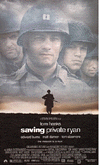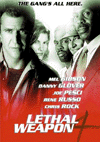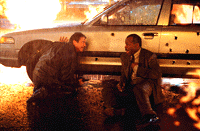
| In This Issue |
 |
| Gloom 'n Doom Piece |
| Exodus Checklist |
| Rewarding the Idiocy |
 |
 |
![]()
"There's really nothing like a shorn scrotum... exhilarating. I suggest you try it."
-Dr. Evil
Back in the good old days, Tom Hanks seemed to be our friend. At least he seemed relatively harmless-putzing around with his white-boy afro and goofy grin in Bosom Buddies or Bachelor Party. Sure, he probably wouldn't have had the nerve to deliver a monologue about ritualistic testicle-shavings like the one above, but neither was he winning Oscars for
 |
I guess it was inevitable for such a beloved comic-turned-serious thespian to team up with Steven Spielberg, a director who has undergone a pretty serious fluff-to-"art" transformation in his own right (as well as becoming progressively more annoying and less watchable in the process.)
The jury is still out on Hanks's actual intelligence/skill or lack thereof, i.e., a non-Hollywood insider cannot know for sure whether Tom is truly a moron or if his enthusiastic idiocy in recent years simply represents a successful application of the Aerosmith theorem, which states that the fan base of a given pop-cultural icon will be the set of individuals whose intelligence level is just below that-whether real or simulated-exhibited by the icon. Put more simply: apparent stupidity equals genuine popularity. So the kings of the airwaves are inevitably those astute entertainers who-like Aerosmith-pretend to be just a wee bit smarter than the brain-dead bottom feeders who overpopulate the lower level of the human food-chain pyramid. With Spielberg, on the other hand, there is no denying that he is a clever, skilled filmmaker. He's just damn good at hiding it-especially when he's in "serious" mode.
This is really Steve's fatal flow as a real director, as far as I'm concerned: although capable of truly exceptional work he always assumes the very worst about his audience's collective cranium, employing the broadest strokes possible to deliver his simplistic messages (Nazis are evil; killing Jews is wrong, it's not nice to be mean; sharks/dinosaurs are scary; a bearded twerp from Orange County should not film ideological novels about Reconstruction-era Southern blacks, particularly if both Whoopi Goldberg and Oprah Winfrey are involved; etc.). Not that Steve's manipulative calculations aren't 100% effective, of course. Over the past two decades, record numbers of box-office bovines have clearly demonstrated the viability of what is perhaps best described as art-house cinema for the Olive Garden set. Nobody ever went broke underestimating the blah blah blah and all that shit...
With Saving Private Ryan, Spielberg finally undertakes a direct assault on the most obvious message of them all: War Is Hell. Steve wastes a good two hours trying to deliver this message via old-fashioned techniques like drama and characterization, but it is the exposed entrails and exploded heads of the brutal opening battle scene that really do the job-after all, no matter how unpleasant it would likely be to roam the countryside of Normandy with the twin Toms Hanks and Sizemore bossing you around, it still beats having your crotch shot to hell and lying helplessly in a pool of your own intestines on Omaha Beach. Such is the theory, at any rate.
 |
On the subject of factual errors, the fanciful delusions of festively plump reviewers are nothing compared to the absurd mess the Russian subtitles [another note to MT Out: the version playing here is not dubbed] make of things. Usually pretty out there as it is, the subtitles here are further confused in the presence of simultaneous Ryan, another soldier named Rabben or something like that, and the similar-sounding ryadovoi (private). But it's not too hard to imagine how such ridiculous goofs found their way into what you'd expect to be a more professional rendering-any native English-speaker whose job with a linguistically oriented job here has probably met the Soviet-educated ekspert who's convinced he knows English better than you. I guess It would help if someone told Russia's subtitular artistes that many Hollywood scripts can be found for free on the Internet. Still, it's no wonder Russians prefer dubbing.
Anyway, the flick is a heterogeneous mixture of Jaws and the effective bits of Jurassic Park (the first one) with some of the more unfortunate aspects of Schindler's List. It's not as bad as The Color Purple, though. The Death Porn gore of the opening battle is discarded permanently early enough so that overly sensitive short-attention-span types won't still be offended by the end. The imitation hand-held documentary camerawork ("imitation" because a ridiculous amount of money was obviously spent recreating the grainy effect that documentarians achieve by virtue of their low budgets), as well as the Oliver Stone-style strobo-hallucinatory images and nonsensical rapid-fire editing (which is at least more appropriate to the context here than in the average Stone atrocity), stick around for the duration. The latter two lend the battle scenes a Sony PlayStation feel so unmistakable that it's hard to think the effect was unintentional. I can't imagine why Spielberg brought in such a mode-unless maybe he saw it as a way to seduce the coveted pre-teen and pot-head slacker demographics of potential multiple-viewers.
The John Williams score (for which he'll no doubt take home another Oscar) is the real kicker. I know I always bitch about composers, but these guys really are the industry's most disgusting malfeasants. In many ways, Williams is the worst of all, his career uncannily mirroring Yeltsin's in several ways. After some effective early triumphs (Jaws, Star Wars)-the right music for the right films at the right times, even if it was just stolen and simplified Stravinsky or Dvorak-his conspicuous flaws have become ever more apparent, and the quality of the films with which he has been associated have suffered as a result.
Never have his hack condensations been as out-of-place as they are here. Following the D-Day invasion, Hanks surveys the brutal carnage to the soothing sounds of an upbeat baritone horn cadenza that would be right at home in Penny Marshall's heavier work. It seems to me that one of the most abominable events in recent human history should be compelling enough without incidental music, let alone the overture from Tommy.
Spielberg allows plenty else to get fucked up, as well; to me, the simplistic current-day epilogue is most illustrative. As in Schindler's List, we see survivors in a cemetery, reminding us that-despite the story's pollyannaish conclusion-many, many people died during the events just witnessed. Now I can live with that. But when the elderly protagonist talks out loud to the commemorative cross before him, Spielberg is taking his lowest-common-denominator approach way too far. I shudder to imagine the living, breathing person who would give voice to his thoughts in such a situation. In fact, I rather suspect that the only person who would is the generic everyman in a Spielberg movie. Maybe I've been away from the U.S. too long, but I sincerely believe that even my dimmest compatriots would have figured out what was on the old guy's mind if Steve hadn't made him blurt it out so clumsily.
On the other hand, irate Russian nationalists might get a blast watching so many Americans (not to mention a few Germans) bite it in one movie.
Compared to the above, analyzing Lethal Weapon 4 is simplicity itself. Six years down the road from the previous installment, the successful buddy team is still combining fatuous moments of sentimental bonding with dazzling stunt sequences involving more consequence-free ultra-violence than an S&M Shriners' Convention.
 |

|
Some pertinent details for the literal-minded. The perps and their crime: Chinese gangsters illegally smuggling in their countrymen for slave labor (plus the usual theft, murder, etc.). The shtick: Riggs finally admits he's getting old; Babies on the way; What a great big happy multi-racial family we all are (this last bit gets pretty damn grating).
All in all, it's about as good a mindless ride as the two previous sequels, which essentially reconfirms the series's standing as the best nationwide propaganda the LAPD can buy. Chances are you'll find it adequate, and it won't matter a damn bit.


